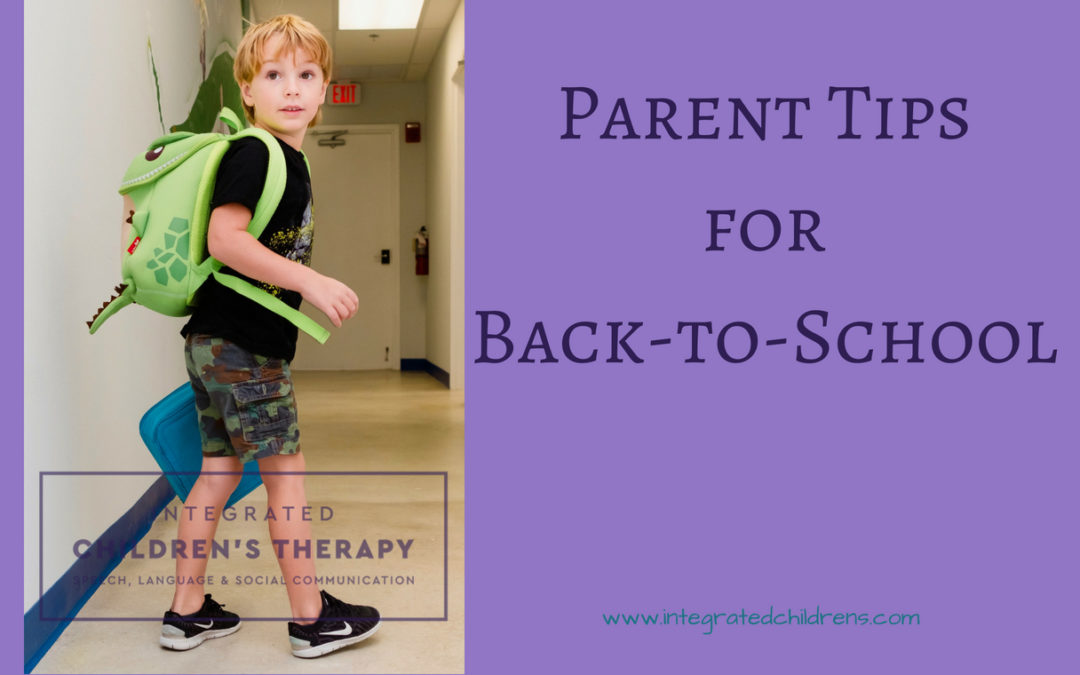It’s that time of year again: Summer is winding down as you gear up for a change in routine.
Starting school after summer vacation is a big change for most kids. For little ones going to school for the first time, or for children with developmental or social challenges, it can be especially tough.
We checked in with one of our speech-language pathologists, Katie Sacasa (who’s also a mom), to get tips for making the transition back to school as smooth as possible. The key, Katie says, is preparation. Here are ways you can start preparing today:
Prepare for Routine
If summer has been a time of relaxed bedtimes and slow mornings, some days at camp and others at home, dedicate the next days to getting back into a routine. Start a school-year bedtime and wake-up time. Have your child get dressed and eat breakfast as if it’s a school day. Plan an outing at the time you will leave for school, and tell her this will be her morning routine when school starts.
Prepare for When
Grab a calendar, sit with your child, and show her how many days are left until school starts. Have her check off each day and count the remaining days.
When school starts, you can help her anticipate the weekday/weekend rhythm by writing “school day” on each weekday and “weekend” on each weekend day (or use colors or symbols for non-readers). Show her the calendar every day so she can count the days left until the weekend or the next school week.
Prepare for What
If it’s your child’s first school or a new school, drive by, take a tour, or ask if you can meet her teacher. Snap a photograph of the school or her teacher to look at in the days leading up to her first day.
To help her know what to expect at school, ask for a daily schedule. If she’s a reader, go over the schedule with her for a few days. If she’s not a reader, you can draw pictures or symbols of daily activities, or even find and print images online. It can also be helpful to create a book with your child of the daily schedule and go through it as if reading her a story.
Prepare for Challenges
If you know there are certain things your child struggles with, like social interaction or listening, role-playing may help. Pretend you’re another child and practice social interactions, or pretend you’re the teacher and practice expected behaviors.
Prepare for Communication
Especially if your child has developmental or social challenges, it can be helpful to call her teacher or send an email before school starts. Give a little background information, touch on things that may be helpful for her teacher to know, and mention that you’d like to have open communication about any questions or concerns that come up.
Prepare for Rest
The first few weeks of school, your child will likely be tired from the change, excitement and anxiety. Plan to give her as much downtime as possible outside of school. Dealing with change tends to be easier for all of us when we have time to rest and recharge!
Prepare for Fun
Focus on things you know your child enjoys, and talk positively about them in the context of going to school. Tell her she will meet new children, or see old friends. Talk about how she will get to enjoy her favorite lunch halfway through the day, or make something in art class.
Another way to use fun to motivate and comfort your child is to plan a favorite activity for the weekend, or even after the first day. This can be something simple, like having a small treat, going to her favorite park, or going to the movies. Remind her about the activity so she can look forward to it throughout the day or week.
We wish you happy last days of summer and a smooth transition to the new school year!


Recent Comments